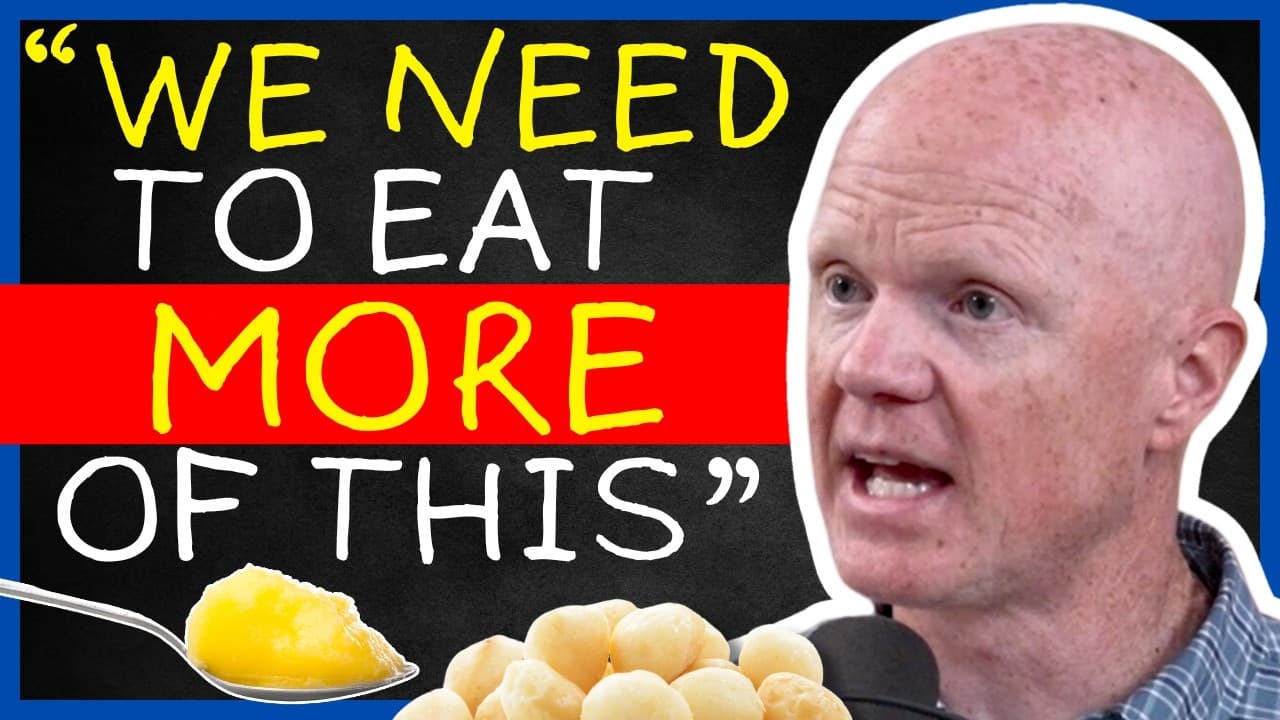Fat Cell Scientist Reveals How to Lose Fat & Keep it Off Without Ever Restricting Diet | Dr. Bikman
30 Aug 2024 (over 1 year ago)

Insulin and Fat Storage
- Lipolysis, the breakdown of fat from fat cells, is directly inhibited by insulin. As insulin levels increase, lipolysis decreases, even when other stimuli are present. (25s)
- Insulin influences the movement of fat into fat cells, particularly in smaller fat cells. As fat cells grow larger, insulin's effect on fat uptake diminishes, but it continues to control lipolysis. (1m32s)
- When fat cells reach their maximum size, they become insulin resistant to prevent themselves from getting any larger. (6m1s)
- Insulin's effect on lipolysis (fat breakdown) functions like a dimmer switch, not an on/off switch. (15m9s)
- When insulin levels rise, free fatty acids in the blood decrease rapidly. Conversely, as insulin levels drop, such as during fasting, free fatty acids increase. (16m21s)
- Dr. George Cahill's research shows that as insulin decreases to around 10 micro-units per milliliter, lipolysis increases. (16m59s)
- Insulin resistance in fat cells is indicated by elevated insulin and free fatty acid levels. (18m20s)
- When insulin levels are high, the body burns glucose as its primary fuel source. (19m44s)
- While insulin is required to signal fat storage, calories are needed to fuel fat cell growth. (22m29s)
Fat Cell Growth and Insulin Sensitivity
- Approximately 80% of obese individuals become obese through hypertrophy, where the size of fat cells increases without an increase in the number of fat cells. This hypertrophy can lead to insulin resistance and inflammation. (3m7s)
- The TZD class of drugs improves insulin sensitivity but also stimulates the body to create new fat cells. (6m54s)
- Individuals with higher insulin sensitivity have a greater potential for fat gain, particularly through fat cell hypertrophy. (23m10s)
- While insulin-sensitive individuals may gain fat more readily, their bodies also clear glucose from the bloodstream more efficiently due to a shorter duration of elevated insulin levels. (24m20s)
Sex Hormones and Fat Distribution
- Estrogen signals greater subcutaneous hyperplasia, which is why women typically store more fat in their buttocks and hips. (9m44s)
- In a study, both males and females who consumed isocaloric drinks of high glucose or high fructose gained fat, but the location of fat gain differed. (11m37s)
- High glucose drinkers gained more subcutaneous fat, which is the pinchable fat that predominates on the female body. (11m49s)
Fructose Consumption and Visceral Fat
- High fructose drinkers gained more visceral fat, which is stored around internal organs. (11m59s)
- The liver metabolizes fructose and converts it into fat, which is then stored in visceral adipocytes. (12m7s)
- Fructose consumption selectively promotes greater visceral fat storage, and this can come from sources like fruit juice and sugar. (12m27s)
- There may be a genetic component to how well individuals can metabolize fructose, similar to how some people metabolize alcohol better. (13m46s)
- Whole fruits are generally recommended over juiced fruits for improving insulin sensitivity and controlling carbohydrate intake. (14m25s)
Insulin Resistance and Health
- Prolonged periods of low insulin levels are beneficial for overall health, including maintaining a healthy weight, cognitive function, and cardiometabolic well-being. (27m34s)
- Insulin resistance is the most common health disorder in the world and is likely caused by frequent consumption of refined carbohydrates. (28m30s)
Protein Consumption and Insulin Response
- Consuming protein without glucose present does not cause a significant insulin spike. (31m58s)
- Consuming protein with glucose or with underlying hypoglycemia will cause a larger insulin spike than consuming carbohydrates alone. (32m24s)
- Individuals with Type 2 diabetes may benefit from monitoring their protein intake. (33m14s)
- Consuming protein with fat leads to a greater increase in muscle protein synthesis compared to consuming protein alone. (34m8s)
- Bile, while crucial for fat digestion, also plays a role in facilitating the enzymes responsible for protein digestion. (35m2s)
- Whey protein concentrate with whole milk is a better option for the average individual who wants to be healthy and strong. (38m29s)
Calorie Intake, Insulin, and Weight Loss
- Dr. David Ludwig published a series of papers demonstrating that if calorie intake is reduced but insulin levels remain high, calorie nutrients are pushed into tissues, leaving less available in the blood. (40m10s)
- Lowering insulin can increase metabolic rate, leading to fat burning and the production of ketones, which are then eliminated through breath and urine, contributing to weight loss. (41m42s)
- A person eating 1,000 calories solely from carbohydrates will experience weight loss, but it will consist of a higher proportion of lean mass compared to fat mass. (43m44s)
- To accurately compare the effectiveness of low-carb and low-fat diets, studies should involve hypercaloric versions of both, where calorie intake is matched, to determine which diet leads to less fat gain. (45m13s)
Carbohydrate Consumption and Blood Sugar
- When consuming carbohydrates, it is advisable to obtain them from whole fruits and vegetables rather than processed foods, as the fiber content in natural sources helps regulate blood sugar levels. (47m40s)
- People should give themselves time to achieve normal blood glucose levels before going to bed. (48m50s)